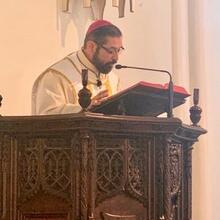Much of the discussion, often rancorous, within the church about the inadmissibility of the death penalty centers around the historical fact that Scripture and tradition acknowledge the authority of the civil authority to administer it. How, then, can the church say it cannot justly be administered today by the public authority?
It seems clear that Pope Francis, developing an impulse already evident in the teaching of St. John Paul II and Pope Benedict, teaches that the death penalty is a violation of a prior, ineradicable human dignity granted by God, and that the conditions no longer exist wherein the state may justly condemn a person to death.
First of all, even when the church acknowledged in principle the authority of the state in this matter, it did often intervene on behalf of those considered unjustly condemned. Appeals for the life of St. Thomas More, or more recently Jacques Fesch in France in 1957, come to mind. This makes the point that the authority of the state was never considered to have no limits, nor was it considered immune from the moral judgment of the church.
If the church can condemn an unjust use of the death penalty in particular cases, it may do so in general by indicating that the conditions for just administration are not fulfilled in contemporary society. Further, the good of protecting others can be addressed in other ways.
We as a country cannot simply say, “the government made the decision,” so it must be just. Herod made a decision, too.
This was in part the purpose of my comment on Twitter, proposed in the form of a question, comparing the federal government’s execution of Brandon Bernard to the decision of King Herod to execute St. John the Baptist. Both were acts of a public authority. Herod’s decision was obviously unjust, an almost Girardian example of blood lust. That Brandon Bernard was accused of heinous crimes is not in dispute. But we as a country cannot simply say, “the government made the decision,” so it must be just. Herod made a decision, too.
There are far too many questions about how the death penalty is pursued in heinous cases today. Was Mr. Bernard given a fair chance to defend himself? Is the disproportionate application of the death penalty upon the poor, African-Americans and other minorities relevant to how his trial came to end in a death sentence? Does a modern obsession with “someone has to die” for a heinous crime have some relation to a wider societal lust for vengeance? Did this attitude contribute to his death sentence? These are all moral considerations that the question about Herod’s decision implies. And all of these questions are relevant to the church’s wider judgment that the death penalty should be abolished worldwide.
I would note also that the pope’s authority to modify the Catechism of the Catholic Church is clear. The social doctrine of the church is indeed doctrine, a part of the magisterial tradition that, like the whole of the magisterium, flows from the profound ecclesial reception in faith, hope and charity of the Word made flesh, and of the paschal mystery. This doctrine has developed gradually, according to the judgment of the church. This is evidenced historically, for example, by various papal decrees condemning slavery (ignored by many nations until much later), by Pope Pius IX’s modification of canon law in 1869 to make it clearer that human life is to be protected from the moment of conception and by Pope Francis’ most recent modification of the Catechism on the subject of capital punishment.
To say the death penalty is not an intrinsic evil but rather a matter of prudential judgment and thus it need not be taken so seriously by a Catholic is inaccurate.
To say the death penalty is not an intrinsic evil but rather a matter of prudential judgment and thus it need not be taken so seriously by a Catholic is inaccurate. From a Catholic perspective, that we can make distinctions between the moral factors differentiating one heinous evil from another (they are not all the same) is in no way meant to lessen our commitment to defending the lives of all. Vulnerability, in the end, is the most basic human poverty. There are many heinous evils in the world, all of which assault the dignity of the human person. They all have in common the use of power, sometimes legal and sometimes not, to dehumanize, manipulate and commodify the vulnerable. Yes, the death row criminal is in the power of the state. Our death row protocols strip the condemned of their dignity; they are isolated, injected with poison and die alone, save for the official witnesses.
What are we doing? This dehumanizes us even more than it does the condemned.
Does the death penalty flow from a securely just process? Does killing people make us safer? Does it solve any problems that could not be addressed in other more humane ways? Does it uphold human dignity? According to the social teaching of the church, the answer is no.
More from America
- Bishop Flores evangelizes on Twitter. Now he is in charge of doctrine for the U.S. bishops.
- 10 reasons to oppose the death penalty
- Six Catholics are on the Supreme Court. What they should do on death penalty cases isn’t clear—or satisfying.
- How should pro-life Catholics who voted for Joe Biden approach the next four years?








